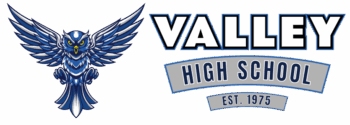The faculty and staff of Valley High School recognize that each student who enters the school is an individual with a name, a family, unique abilities, personal desires, and specific needs. Treating each student individually with respect and nourishing their creativity, Valley High School is a haven and non-threatening atmosphere for the learning of nontraditional students.The rules and policies of Valley High School are designed to build student responsibility by making students accountable for their work and actions, ultimately taking charge of their own learning.The focus at Valley High School is on learning and the success of students rather than on extracurricular activities.
Valley High School, as an alternative to regular high school, is not an easy way out, nor is it diluted learning, but rather it is a better way to educate nontraditional students.To the Valley High staff and faculty, fairness is not to provide the same for every student, but to provide equally for each student according to individual needs.In order to foster responsibility, self esteem, and learning, Valley High School works toward these objectives:
Valley's Beliefs
- Valley should be a school where success is possible and probable for all students.
- Students who need an alternative approach to education are capable of learning, but for those students the right environment is crucial to their success.
- The learning environment should be safe, secure and non-threatening.
Students should be treated as individuals, not as stereotyped "students"
Teachers should strive to know students well, build rapport with them, and respect them as individuals. - Teachers and staff need to work as a unified whole for the personal and academic progress of all students.
- Teachers should use a variety of teaching methods and adjust methods in ways that facilitate more learning.
- It is important to make connections with students by building learning communities in the classroom and throughout the school.
- The focus of the curriculum should be on what is learned, not simply what is taught.
- The curriculum should connect to real-life applications of knowledge and skills and help students link their education to the future.
- The academic program should extent beyond the Valley campus to take advantage of learning opportunities outside the four walls of the classroom.
- The school should work with the community to be a good neighbor and to provide for the needs of its youth.

